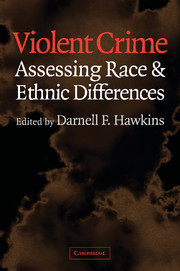Book contents
- Frontmatter
- Contents
- Contributors
- Foreword
- Editor's Introduction
- Violent Crime
- Part I Homicide Studies
- Part II Other Contexts, Settings, and Forms of Violence
- Part III Explaining Racial and Ethnic Differences
- 11 How Can the Relationship between Race and Violence be Explained?
- 12 “Race Effects” and Conceptual Ambiguity in Violence Research: Bringing Inequality Back In
- 13 The Violent Black Male: Conceptions of Race in Criminological Theories
- 14 The Structural-Cultural Perspective: A Theory of Black Male Violence
- 15 A Cultural Psychology Framework for the Study of African-American Morality and Violence
- 16 Racial Discrimination and Violence: A Longitudinal Perspective
- 17 Honor, Class, and White Southern Violence: A Historical Perspective
- References
- Index
17 - Honor, Class, and White Southern Violence: A Historical Perspective
Published online by Cambridge University Press: 22 August 2009
- Frontmatter
- Contents
- Contributors
- Foreword
- Editor's Introduction
- Violent Crime
- Part I Homicide Studies
- Part II Other Contexts, Settings, and Forms of Violence
- Part III Explaining Racial and Ethnic Differences
- 11 How Can the Relationship between Race and Violence be Explained?
- 12 “Race Effects” and Conceptual Ambiguity in Violence Research: Bringing Inequality Back In
- 13 The Violent Black Male: Conceptions of Race in Criminological Theories
- 14 The Structural-Cultural Perspective: A Theory of Black Male Violence
- 15 A Cultural Psychology Framework for the Study of African-American Morality and Violence
- 16 Racial Discrimination and Violence: A Longitudinal Perspective
- 17 Honor, Class, and White Southern Violence: A Historical Perspective
- References
- Index
Summary
Introduction
It is important for researchers of violence to remember that there are substantial intraracial differences in involvement in violence. In this chapter, I will explore the extent and determinants of those differences for Americans of European descent. Many of the past and contemporary explanations aimed at explaining racial and ethnic differences have tended to note the importance of culture and values (e.g., early work of Sellin on culture conflict). I focus here on white males in the South during the nineteenth century, examining the aspects of Southern culture that have been identified by various scholars as playing a role in the etiology of violence. My focus is specifically the nexus of honor, class, and violence. Interacting in a number of ways, these factors: (a) determined the circumstances in which a challenge to honor was perceived and how it was responded to; (b) determined how white males interacted not only with male peers, but with white women and African Americans; and (c) determined how white Southern males defined themselves as men.
As I will discuss, the historic existence of a “culture of honor” in the antebellum (pre–Civil War) South and in the postbellum (post–Civil War) South is generally accepted by historians. The question for modern social scientists is whether or not this culture of honor continues to play some role in creating a “subculture of violence” in the present-day South. Is the South more violent today than other regions of the country?
- Type
- Chapter
- Information
- Violent CrimeAssessing Race and Ethnic Differences, pp. 331 - 354Publisher: Cambridge University PressPrint publication year: 2003



